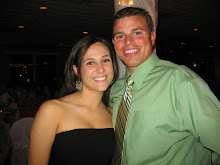Wednesday, January 28, 2009
1620 (TESTS) Throughout Education.
I never imagined taking 1,620 tests throughout the years of my education. That seems like a really big number and I can only really remember taking a few of them. Most of them I probubly never really cared about or had a big impact on my education. This video talks about different ways to test/assess students that don't follow the so called formal/ordinary tests most teachers assign. I remember the assessments that I didn't need to stress over to take part in, but still retain important information from it. I'm not saying that studying is a bad thing; I feel that if you let the students know they are going to be tested in a more hands on kind of way, they will get more out of the assessment. The hardest thing for a teacher is taking the time to be creative and come up with the different kinds of assessments to use. The difference afterwords will promote a great improvement in both the students experience and the teachers.
Subscribe to:
Post Comments (Atom)



2 comments:
I agree with Tommy's blog on 1620 (tests) but we need to test our students not only to see if they are mastering the material but we are also putting ourselves in check to see if we are teaching in a way that can be mastered. Teaching in the 21st century is difficult - the students no longer want the "traditional" education that many of us received. We must incorporate technology into our instructional plans but there are many things which limit us for providing this in an optimal way. The video "A Vision of K-12 Students Today" expresses our students desire to have technology as part of their daily curriculum - it would be great if we had an endless supply of money and time - to have Smart Boards in each class, and a computer lab in each class that can accommodate 35 students - but the facts are that money is not endless. We have class periods of 40 minutes per period so we are also under time constraints. You also must abide by the CCCS and your district requirements and complete the curriculum before the benchmark assessments. There is not alot of time for innovation. You have to work with traditional resources like books, paper, pens and pencils to get the job done and infuse technology if and when it is available! I am absolutely not opposed to technology in the classroom - my undergrad is in Computer Science!
I know... This video hit home with me, too. But then I started thinking about the weekly vocabulary quizzes and timed math tests. It may be accurate!
Thanks for posting. Your blog postings are always interesting to read.
:)
Post a Comment